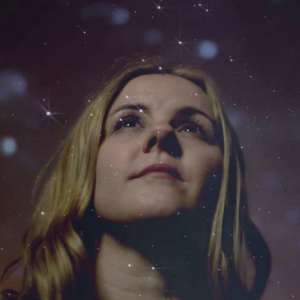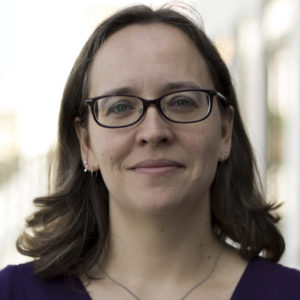iTunes | Google Play | RSS (Soundcloud) | Stitcher
Welcome to the Ada Lovelace Day podcast, highlighting the work of women in STEM. Each month, we talk to women from around the STEM world about their careers, as well as talking to women and men, about historic and modern women’s achievements, discoveries, and inventions.
In this episode
01:33: Astrophysicist Professor Haley Gomez talks about how cosmic dust is formed, how it affects our view of the universe, and it’s role in the formation of planets.
26:53: Astronomer Dr Karen Masters talks about Mary Somerville, mathematician, astronomer and translator of Pierre-Simon Laplace’s book about the Solar System, Mécanique Céleste.
Our interviewees
Professor Haley Gomez
 Professor Haley Gomez is an astrophysicist working at Cardiff University’s School of Physics and Astronomy. She uses the most sensitive infrared cameras in space, such as the Herschel Space Observatory and the James Web Space Telescope, to reveal the origins of the building blocks of life: cosmic dust grains. She has published over 100 papers, and her research has been recognised with an award from the Royal Astronomical Society for noteworthy contribution for an early career researcher. In 2015, she was also awarded a prestigious and highly competitive grant worth €1.8 million to measure the dust content of galaxies since the Big Bang.
Professor Haley Gomez is an astrophysicist working at Cardiff University’s School of Physics and Astronomy. She uses the most sensitive infrared cameras in space, such as the Herschel Space Observatory and the James Web Space Telescope, to reveal the origins of the building blocks of life: cosmic dust grains. She has published over 100 papers, and her research has been recognised with an award from the Royal Astronomical Society for noteworthy contribution for an early career researcher. In 2015, she was also awarded a prestigious and highly competitive grant worth €1.8 million to measure the dust content of galaxies since the Big Bang.
Throughout her career, she has also taken a leading role in bringing research to the public and, in particular, encouraging girls and children from disadvantaged backgrounds. She received an Inspire Wales Award in 2014 for most inspirational person in the Science and Technology Category for this work.
You can find out more about Haley on her website, watch her TED talk at the bottom of this page, and can follow her on Twitter: @astrofairy.
Haley’s work has featured in a number of articles:
- Phys.org: Universe becoming cleaner as cosmic dust gets mopped up by stars, astronomers reveal
- Space.com: Violent star explosion reveals origins of space dust
- Phys.org: Explosive origins for cosmic dust
Dr Karen Masters
 Dr Karen Masters is an astronomer working at the Institute of Cosmology and Gravitation, University of Portsmouth in the UK. She is the spokesperson for the Sloan Digital Sky Survey (SDSS-IV) and the project scientist for the Galaxy Zoo Citizen Science Project. As well as working on her research into galaxy evolution, she has a passion for science (especially astronomy) outreach and public engagement, and for the promotion of equality and diversity in STEM. Karen contributes to the Galaxy Zoo blog and the SDSS science blog.
Dr Karen Masters is an astronomer working at the Institute of Cosmology and Gravitation, University of Portsmouth in the UK. She is the spokesperson for the Sloan Digital Sky Survey (SDSS-IV) and the project scientist for the Galaxy Zoo Citizen Science Project. As well as working on her research into galaxy evolution, she has a passion for science (especially astronomy) outreach and public engagement, and for the promotion of equality and diversity in STEM. Karen contributes to the Galaxy Zoo blog and the SDSS science blog.
You can find out more about Karen on her blog, The Beautiful Stars, and can follow her on Twitter, @KarenLMasters. And you can also read an excerpt from her More Passion for Science chapter about Mary Somerville, and read the Royal Astronomical Society’s blog post on Somverville.
Thanks to our sponsor
This podcast is brought to you thanks to the generous support of ARM, our exclusive semiconductor industry sponsor. You can learn more about ARM on their website at ARM.com and you can follow them on Twitter at @ARMHoldings.
If you would like to join ARM as a sponsor of the Ada Lovelace Day Podcast, please email us.
Get in touch!
If you’d like to send us feedback about the show, or if you’d like to take part, please email us. We’re especially interested in hear from men who would like to talk to us about the women in STEM who have influenced them, especially those women who are less well known.
Credits
Episode edited by Andrew Marks.